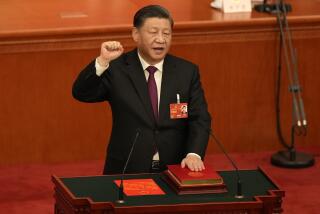China’s Party Chief Predicts a ‘Bright Communist Future’
- Share via
BEIJING — Chinese Communist Party chief Jiang Zemin, in a hard-line address Friday, predicted “a bright Communist future for mankind.”
“The socialist system possesses strong historical vitality and great viability,” Jiang told 10,000 selected officials and Beijing residents gathered at the Great Hall of the People for the start of weekend National Day festivities.
“Those who have noticed only some adverse currents and failed to see the irreversible course of history are politically shortsighted observers. Socialism replacing capitalism is the real mainstream of history.”
Jiang conceded that in China there are strong forces advocating the dismantling of socialism and the transformation of China into a capitalist democracy. He described this conflict as “a serious class struggle that concerns the life and death of our party, state and nation.”
This domestic political conflict, he said, involves “two completely different views” as to the true meaning of China’s decade-old policies of market-oriented reforms and opening to the outside world.
One view, he said, holds that “reform and opening” refers to the “self-improvement of the socialist system” under Communist Party rule. The other “is the stand of those who demand ‘total Westernization.’ ”
He said that such “so-called reform and opening constitutes transformation into capitalism and brings China into the orbit of the capitalist system of the West.”
The two viewpoints “stand in diametric opposition,” Jiang said, and added that “it can be said that this contrast is reflected, to a great extent, in the problem of whether or not in the reform and opening we persist in the orientation of socialism.”
Jiang said that China should permanently maintain a mixed economy dominated by public ownership and regulated by a combination of central planning and market forces.
Warns of Economic Dangers
“If we persist in weakening and totally negate the planned economy, and try to create a completely market-oriented economy,” he said, “it wouldn’t work in China and would surely throw the economy and the entire society into confusion.”
Jiang was appointed to the post of Communist Party general secretary in late June, replacing the ousted reformist Zhao Ziyang, who was accused of supporting last spring’s student-led pro-democracy protests. Zhao had also advocated rapid and extensive steps toward a market economy.
Much of Jiang’s 75-minute, nationally televised speech, his first major public address since replacing Zhao, consisted of a broad outline of how China’s leaders now intend to balance different features of the economy. He included defense of market-oriented reforms that already been undertaken in the past 10 years.
“The various policies and measures on reform and opening announced by the party Central Committee and the State Council, including the basic policies and measures for the Special Economic Zones and the open areas along the coast, should be further implemented and perfected in practice,” he said. Special Economic Zones are the places where market forces have been given the freest rein.
Jiang endorsed “the beneficial and necessary supplementary role of the individual economy, the private economy, Chinese-foreign joint ventures, cooperative enterprises and foreign-owned enterprises.”
But this does not mean, he said, “in any way weakening or eliminating the position of public ownership as the main sector, much less do we want to ‘privatize’ our economy.”
The term “socialist reform” means making necessary economic, political and ideological adjustments to China’s present system to make it more effective, Jiang said. Economic growth will depend largely on better education, more effective use of scientific and technical knowledge and increased labor productivity, he said.
Jiang pledged that China will “respect all foreign governments and friends who practice equality in their contacts with China, and we will continue to develop and expand friendly cooperation with them.”
More to Read
Sign up for Essential California
The most important California stories and recommendations in your inbox every morning.
You may occasionally receive promotional content from the Los Angeles Times.










